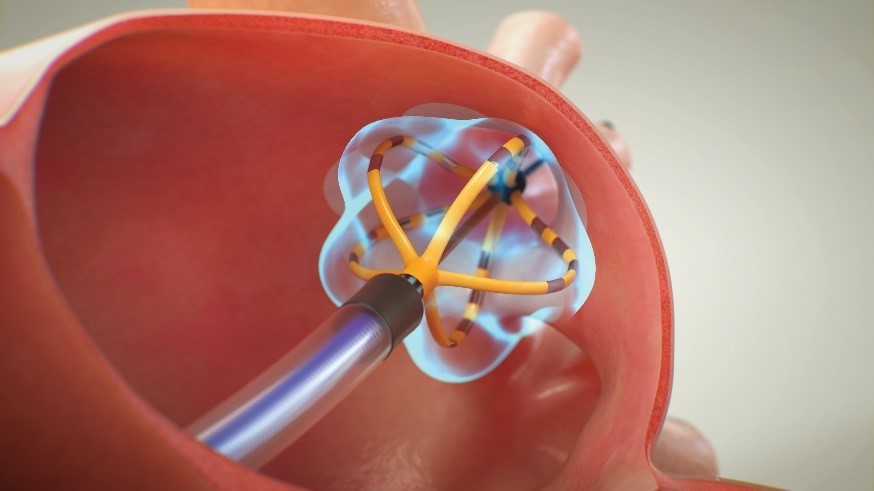Study finds affordable alternative for treating atrial fibrillation
A new study published in BMJ Open1 suggests that using the FARAPULSE™ Pulsed Field Ablation (PFA) System is not only a clinically effective treatment for paroxysmal atrial fibrillation (AF), but also a more affordable option for the National Health Service (NHS) compared to the standard cryoablation treatment.
AF affects over 1.3 million people in England2. It is the most common heart arrhythmia, disrupting the electrical signals in the upper heart chambers. This causes irregular and often rapid heartbeats. AF weakens the heart's pumping ability, allowing blood to pool and potentially form clots. These clots can travel to the brain, significantly increasing stroke risk. The analysis conducted in this paper is significant considering that treating AF in the UK is estimated to directly cost the NHS between £1.4- £2.5 billion annually, with costs principally due to primary admissions3. This is expected to rise over the next two decades3 due to increasing AF prevalence with an ageing population and unhealthy lifestyles.
Catheter design makes the difference

Figure 1: FARAPULSE catheter design.
When medication is not an option, the current standard treatment involves left atrial ablation using thermal energy, such as cryoablation, which carries risks to nearby heart structures. In contrast, the FARAPULSE PFA System with its purpose- shaped catheter reduces collateral damage by selectively targeting heart tissue with an electric field (see Figure 1). While there is strong clinical evidence supporting the efficacy and safety of the FARAPULSE PFA System4, this study marks the first publication to assess the economic implications of adopting this new technology within the UK compared to a well-established alternative.
The analysis carried out by Boston Scientific in collaboration with physicians from Royal Papworth Hospital compared costs associated with treating AF patients with FARAPULSE PFA technology versus cryoablation over 12 months. Findings show that PFA with the FARAPULSE system could offer the NHS a less expensive treatment option compared to cryoablation and highlights other additional benefits to patients and the healthcare system. “We believe this economic analysis continues to highlight the value of the FARAPULSE system for the NHS and hope it will facilitate patient access to this innovative technology,” said Brad Sutton, global chief medical officer, AF Solutions, Boston Scientific.
He added: “As AF prevalence increases, there is a growing demand for treatment that transforms patient outcomes and reduces pressure on the health and social care systems. This is particularly concerning considering that research shows that individuals from areas with the highest deprivation in socioeconomic status have a 26% higher AF-related mortality than those living in the wealthiest areas.”5
Scrutinising various parameters, including procedure costs and complication rates, the study suggested that over a 12-month period, the total average cost per patient for those undergoing PFA was -3% (-£343) less than those who received treatment with cryoablation.
“Pulsed field ablation with the FARAPULSE PFA System represents a significant advancement in our treatment of arrhythmias, including atrial fibrillation,” said Dr. David Begley, clinical director for Cardiology at Royal Papworth Hospital NHS Foundation Trust and co-author of the paper. “The efficacy, combined with a significantly improved safety profile, makes it a viable economic alternative to ablation using thermal energy sources.”
While the study didn’t directly quantify other benefits to patients beyond cost data, these are referenced as part of the broader picture. Under the NHS Long-Term plan, cardiovascular disease is identified as the single biggest condition where lives can be saved over the next 10 years by improving health checks6. Lower rates of complications and fewer recurrent AF episodes not only translate into tangible improvements in patient well-being and quality of life, but also to a reduction in health care resource utilisation.
FARAPULSE is currently available in 12 NHS Trusts in England, including Cambridge, Southampton, Blackpool, and Liverpool. Other NHS Trusts can now apply to NHS England to introduce this technology.
References
1 Duxbury C, Begley D, Heck PM. Pulsed field ablation with the pentaspline catheter compared with cryoablation for the treatment of paroxysmal atrial fibrillation in the UK NHS: a cost-comparison analysis. BMJ Open 2024;14:e079881. doi:10.1136/ bmjopen-2023-079881.
2 NHS Digital. Quality and outcomes framework, 2021-22: prevalence, achievement and Personalised care adjustments at regional and national level. 2022. Available: https://digital.nhs.uk/dataand-information/publications/statistical/quality-and-outcomesframework-achievement-prevalence-and-exceptions-data/2021-22
3 Burdett, P (2022) Atrial fibrillation in the UK: predicting costs of an emerging epidemic recognizing and forecasting the cost drivers of atrial fibrillation-related costs
4 Boston Scientific https://www.bostonscientific.com/en-EU/medical-specialties/electrophysiology/arrhythmias/farapulse-pulsed-field-ablation-system/clinical-evidence.html